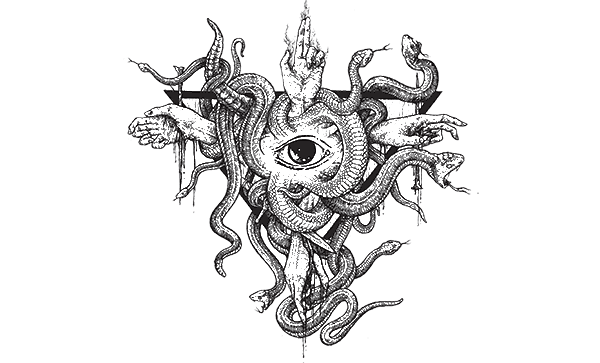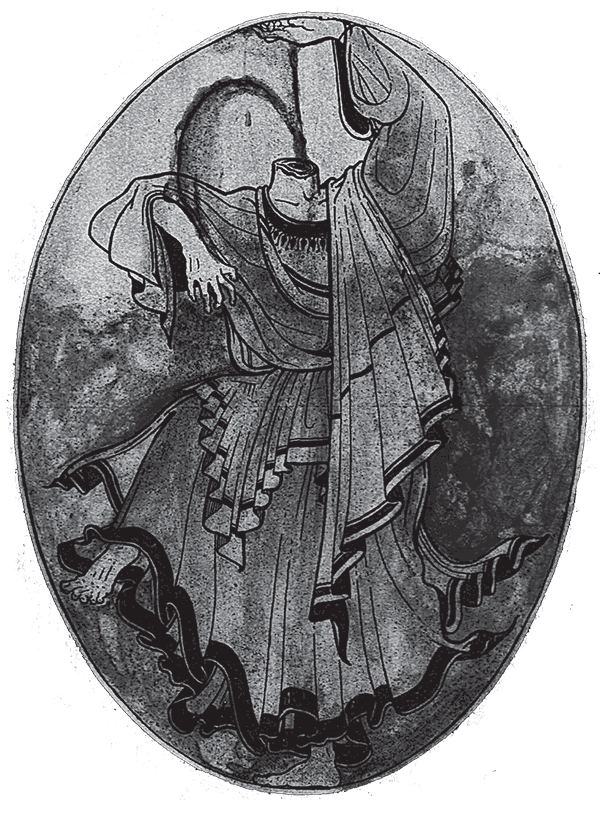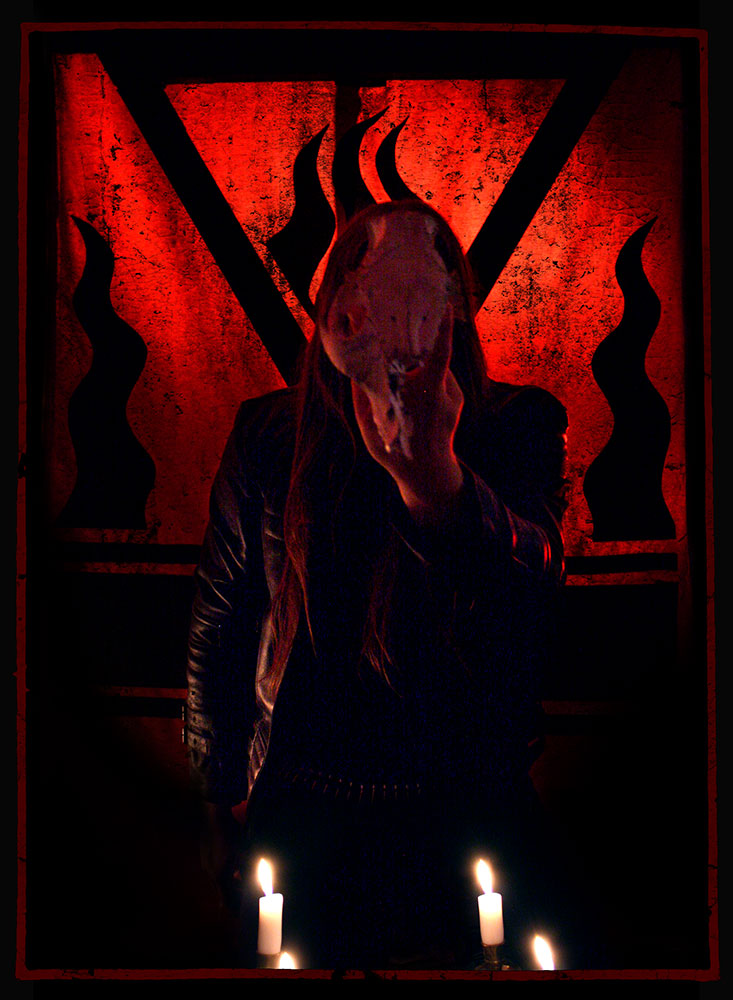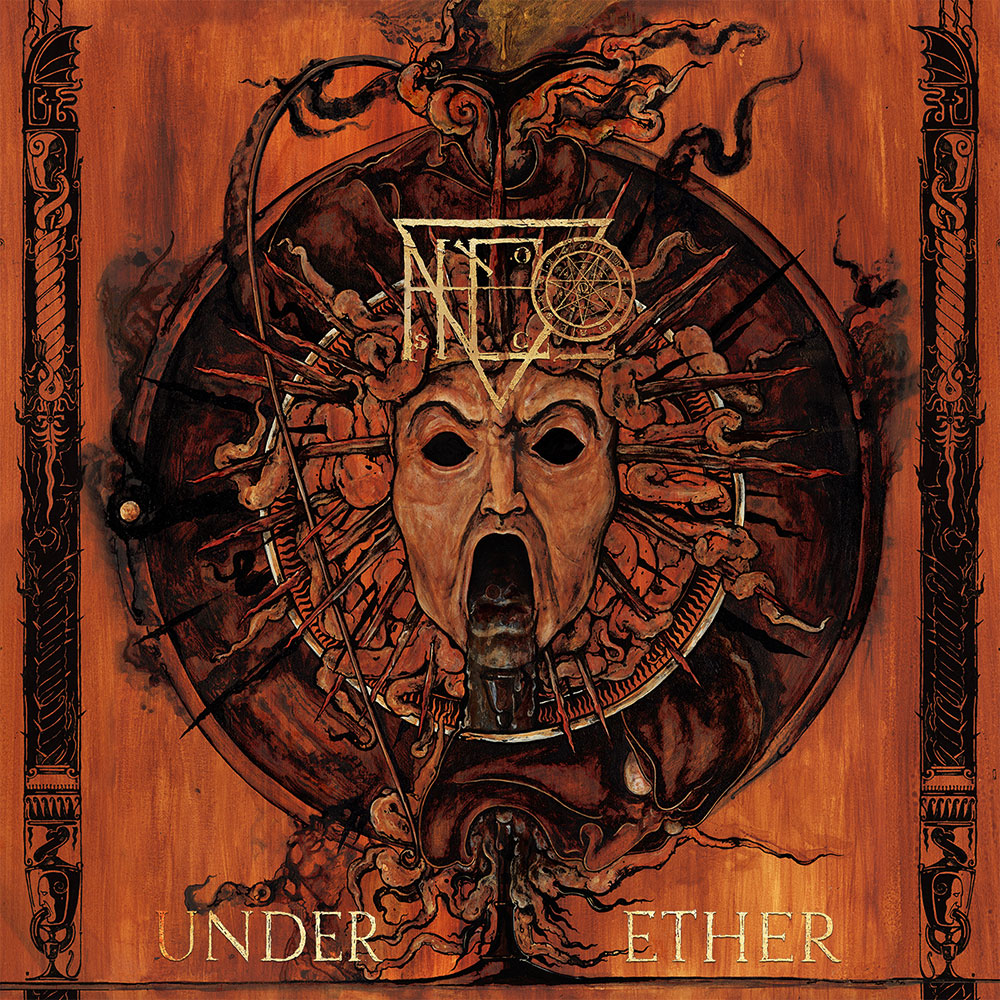Ascension
2018-03-29
by Niklas Göransson
Whispered chthonic secrets ushered in by pain and sorrow – breathing wounds leaving scars of knowing. German black metal band Ascension break their enduring silence to herald the coming of wickedness.
This article can also be found in Bardo Archivology Vol. 2, a printed anthology with selected features from the online archive. Additional content includes NÅSTROND, VOMITOR, NOCTURNUS, XIBALBA ITZAES , Ryan Förster, ANGELCORPSE, THE RUINS OF BEVERAST, MALOKARPATAN, Manhunter: The Story of the Swedish Occultist and Serial Killer Thurneman, WARDRUNA, FORGOTTEN WOODS, LIFVSLEDA, SEIGNEUR VOLAND, and WOLCENSMEN – all presented in ambitious aesthetics with plenty of custom artwork. More information here.

– This album will be challenging for a lot of people – we knew that as soon as it was finished. It’s far from your average black metal record, especially in terms of sound. But isn’t black metal precisely the right art form to be challenged by? I think so. We felt free during its creation, liberated from both inner and outer inhibitions. Fully aware of our own potential, knowing precisely what we didn’t want to do, we acknowledged our place in all this and were able to approach the work with an unbound and proud spirit. “Under Ether” is where this freedom led us; it’s a record about transformation and the in-between, filled with ideas that instinctively feel awkward or even wrong. We’re still in the middle of processing everything, so it’s far too early for us to assess the material objectively. No doubt you’ll have heard this from musicians numerous times before, but it’s nonetheless true.
At the time of this conversation, I had only listened to “Under Ether” – ASCENSION’s third album, released by World Terror Committee in March 2018 – a handful of times and still found it a bit too overwhelming to offer any meaningful first impressions.
– I like that you use the term ’overwhelming’, this was something we often felt during the recording process – especially in the mixing stage. Whilst the sensation of being overwhelmed isn’t necessarily indicative of high quality per se, at least it implies that the material isn’t simple or soulless but rather something with much to discover and come to terms with. We believe “Under Ether” to embody each of those qualities.
ASCENSION have previously described the 2009 demo, “With Burning Tongues”, as a ‘rusty dagger’, whereas “Consolamentum” – the following year’s debut album – was their ‘golden spear’. Consequently, I’m wondering what the weaponised equivalent is here.
– We haven’t thought of the weapon metaphor this time. Not until now, so thank you for asking. Hmm, perhaps a cane sword? Yes, something that strikes without warning – hidden and malignant… beautiful at first sight but deadly in core and essence. Something wicked this way comes.
“Garmonbozia”, the first track, is that a Twin Peaks reference?
– That word only exists in the Twin Peaks universe, as far as I know. Garmonbozia is a sort of mash of what could be described as pain and sorrow made flesh: food for the entities in the Black Lodge. So yes, it’s a reference in a way and not the first – we’ve had one on every record. The song serves as an album introduction; it sets the tone for greater strangeness to come, like a bridge leading straight over into nightmare territory. This strange, haunting feeling is highly present here. Furthermore, at least for me, it also expresses feelings of pain and loss, like a last homage to past experiences before “Ever Staring Eyes” stakes out new pathways. Perhaps one’s goodbye is at its most powerful when not accompanied by a million words? Just a short and commanding musical expression…
He adds that it was also meant as a nod to the idea of staying true to one’s own artistic expression – a philosophy he believes American filmmaker David Lynch, the Twin Peaks co-writer and director, to be an icon of.
– Last but not least, it’s also inspired by the phenomenal idea behind the ending of Twin Peaks. To me, this is nothing short of Lynch’s empowering redemption after they made him reveal his mystery to tie up the second season, twenty-five years ago. He took back what was his from the very beginning. It’s a huge ’Fuck off, I’m going to leave you here’ kind of statement. Anyway, this is a topic for nerd conversations.

The booklet artwork is most impressive, was it once again left to the unguided hand of Dávid Glomba?
– Yes. With “Under Ether”, Dávid had even more freedom than the last time we collaborated. We had many talks throughout the whole creative process but, this time, it was essential to have hearts and not brains coming together. To be honest, it was probably Dávid who was made to suffer the most during this process, but the outcome is brilliant.
Speaking of which, ASCENSION have previously referred to the making of their second album, the 2014 “The Dead of the World”, as a ’truly soul-draining experience’ for everyone involved. I’m assuming “Under Ether” offered additional artistic woes.
– The evolution of the record was based almost solely on feelings and subconscious emotions, which, as we found out, is a rather perilous way of working. However, as long as everyone is one hundred percent convinced of its quality – this is also the way to go. Change is always painful for everyone involved. Heh… I can’t even imagine how tedious it must be, listening to band after band wailing on about the excruciating process of conceiving an album.
Let’s just say I’ve heard it before.
– Trust me, I’d be the first one to say if it was otherwise. Perhaps one day we’ll record something ‘under the influence’ in a studio full of hookers, and then afterwards talk about the great times we had… but that’s just not who we are at this point. I always considered the creative process of art as a form of ritualistic combat where the project’s completion signifies the head of one’s adversary, so to speak. Ultimately, “Under Ether” was not as difficult to make as “The Dead of the World”, but that record stems from a place I don’t want to revisit anytime soon. Nevertheless, it had to be done.
In our pre-interview email exchange, ASCENSION expressed some dismay over having had their album leaked three weeks prior to release. One of the journalists who received an advance promo copy simply decided to put it on YouTube. I can see how that would be annoying.
– I don’t want this discussion to go in the wrong direction. This is not about copyright, illegal YouTube streams, or Russian download sites – nor is it about being lost in the digital age. We have opinions about certain developments, but this is not the right forum to voice them. As an underground band, we know that most who download our music probably never intended to buy it in the first place. So, I guess the amount of people purchasing the album won’t be seriously decreased by the leak. I hope not, at least. This is mostly a matter of principle, especially after all the painstaking months of honing every detail into perfection. The label invested a lot of money as well. We thought about and discussed the way we wanted to present it, step by step. This really is art for us, it means absolutely everything, and we could not take it more seriously. The whole point of promotion is doing the right thing at the right time. To then have this motherfucker, who just pisses on your idea of being an artist, take all this away from us by just putting the whole album online… and, in the aftermath, see certain labels and magazines sharing the initial post, people who should know better somehow. On the other hand, we had quite a lot of feedback from what I’d call ’true fans’; I won’t go into detail, but it made us proud.

Back in 2014, ASCENSION stated that their concept – as laid out by the debut, “Consolamentum” – constitutes the band’s fundamental essence. If I’ve understood the lyrics correctly, this philosophy is explored through the tale of an individual consciousness undergoing the mortal journey.
– “Consolamentum” was about different phases from our existence in the only plane we know right now, despite feeling greater and more than this. It followed a blind human soul from dust and nothingness, through battle and spiritual strife, and back into oblivion: now facing the void with clear sight and open eyes. The idea… or philosophy, as you put it, is that all our future records are experiences – breathing wounds, so to speak – feeding this concept with real-life experiences. I think it’s important to have lived through the topics one sings about, mentally and sometimes physically as well. With that I mean a true understanding of things, felt through any of the possible senses we have for now.
I noticed how the song “Dreaming in Death” appears to have a Lovecraftian theme. Appropriately, the actual music offers some rather unexpected MORBID ANGEL vibes. What leaves me somewhat perplexed here is the assumption that ASCENSION is still a band whose spiritual platform is meant to be taken seriously. As such, perhaps combining presumably earnest metaphysical expressions with fiction and fantasy sends mixed signals.
– Well, first of all, we’re in good company, right? Where would we all be without MORBID ANGEL or METALLICA or… well, you name it? The simplest explanation for why these myths are still cited even today is that Lovecraft tapped into one of mankind’s most ancient terrors, one he was very much haunted by as well. A terrible secret submerged by the sea or beyond time and space, fragility incarnate, and the realisation that we are far smaller than we think – a fear still echoed in these science-driven times. “Dreaming in Death” is a rather cynical song about humanity’s inferior state on the sacrificial altar of higher powers. Lovecraft was doing precisely what great artists have always done: conveying his vision of the world and acting as medium for that which inspired him. The point isn’t whether Cthulhu exists in this shape or if Dunwich is a real place, it’s what he was able to transcend through his work. And, I think, both the archetypes he described and the underlying psychology are very powerful. The Necronomicon is obviously nothing to build one’s faith on, but the idea behind it is certainly something that can be used in black metal. Unlike many others back in the day, I was never drawn to orcs, Tolkien, or anything similar. But seriously, isn’t the music description towards the end of Lovecraft’s short story The Music of Erich Zann an album review that any black metal band would die for?
It would be useless to describe the playing of Erich Zann on that dreadful night. It was more horrible than anything I had ever overheard, because I could now see the expression of his face, and could realise that this time the motive was stark fear. He was trying to make a noise; to ward something off or drown something out – what, I could not imagine, awesome though I felt it must be.
If one entertains the notion of there being powers at earthly play beyond those acknowledged by academia, it sounds reasonable that someone like H.P. Lovecraft was tuned to frequential waves not entirely of this world.
– Yes, and I’m sure this was the case. Just like Hieronymus Bosch was, like David Lynch is, and so on. Art is an expression of the true self, something which unites us with our spiritual heritage. Maybe something we always were or will become in the future, I have no idea. I don’t believe in a one-dimensional time flow but I’m sure we’ll eventually find out. Death is certain, which is a good thing. Isn’t life simply the quest for the right time and place to die?
What’s your take on the infusion of magic in music?
– It’s an alchemical process. Ultimately, you are evoking something out of thin air and filling it with meaning; we must therefore consider music creation, or any other art form, as acts of magic. Referring to a previous example, Trey Azagthoth said in “Covenant”-era interviews that he believed the Ancient Ones to be speaking through his solo guitar. Maybe you think he’s a bad choice because of his later statements but that’s beside the point. I think MORBID ANGEL were truly possessed at a certain stage – music from another plane. I can still feel it today when listening to those records.

One of the few personal details I know about my interviewee is that he spent seminal years obsessed with 90s black metal. As has previously been discussed in this publication, it’s quite remarkable what a profound influence – even decades later – having grown up in such a milieu can wield over how one processes reality.
– I think that goes for all of us, it became a natural and integral part of life and still shapes us to this day. Evaluating one’s own evolution is difficult, bearing in mind here that I recorded my first demo in 1996: twenty-two years ago. I still consider it a call from the grave to the grave, so to speak. Destiny. I should point out here that the Luciferian light, which for me is the essence of black metal, shines through bands from other music genres as well. IN SLAUGHTER NATIVES is a good example. But black metal remains the purest approach to the Devil – it’s still the horn of Satan, sacred ground, arcane music – no matter what people try to make it into today. It’s not for everyone though, despite lots of people wanting to be part of it; on their own terms, of course. ASCENSION’s relationship with the art form is not a nostalgic one, although we do to a certain extent worship its ancient times. I don’t see much point in this ’the good old days were always better’ approach, it’s actually quite embarrassing. The time we live in is now and if you wish things were different, make some changes. Don’t be sobbing about the past if you’re not overturning heaven and earth to change the present.
Lingering emotional attachment to black metal often makes for interesting discourse amongst the elderly. Still to this day, when bands or other involved parties engage in activities deemed blatantly disrespectful or mocking – despite bordering on middle age, and even though it rationally makes no sense to get upset over someone else’s interpretation of a music subculture – many find themselves stricken with an old familiar urge to administer righteous reprimands in the flesh. I suspect the anonymous ascendant might be able to relate.
– Yes, I do, and I think it’s natural in a way. It might be because we spent well over half of our lives in this reality. Inappropriate slights to the art form equal attacks on our background and beliefs, on who we are and, to a certain extent, what constitutes our personality. I think we really must abandon this rational approach that standing your ground ‘makes no sense’. Now, more than ever, it’s important to display some form of reaction, though not necessarily in a physical way. I managed to let a lot of developments pass by me over the last few years. As a band, we were absent from social media for over two years after the last gig in the fall of 2015. Not on purpose, simply because we had nothing of importance to say or present. Just talking for the sake of talking is not something we usually do. But recently, it’s hard not to see what’s going on with parts of the scene. It’s obvious that this is a time to fight and stand your ground. Freedom granted by reassuring statements to self-imposed moral authorities may be a lot of things, but it ain’t freedom.

This article can also be found in Bardo Archivology Vol. 2, a printed anthology with selected features from the online archive. Additional content includes NÅSTROND, VOMITOR, NOCTURNUS, XIBALBA ITZAES , Ryan Förster, ANGELCORPSE, THE RUINS OF BEVERAST, MALOKARPATAN, Manhunter: The Story of the Swedish Occultist and Serial Killer Thurneman, WARDRUNA, FORGOTTEN WOODS, LIFVSLEDA, SEIGNEUR VOLAND, and WOLCENSMEN – all presented in ambitious aesthetics with plenty of custom artwork. More information here.



